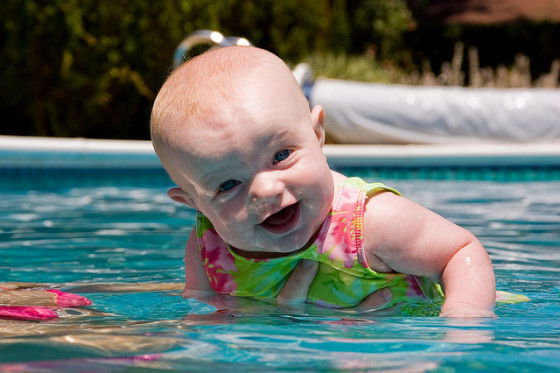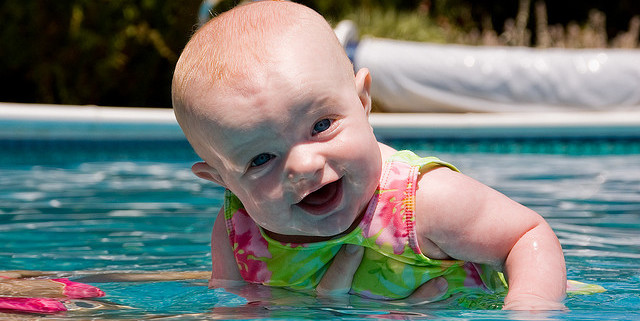Pool Safety For Babies

Contents
Why are swimming pools so dangerous?
The obvious reason is the risk of drowning. In fact, more than 250 children drown in the US every year in swimming pools and hot tubs. That’s not to mention the thousands that are injured and hospitalized. Children that fall into the pool can aspirate water, causing lung damage and depriving their developing brains of crucial oxygen.
However, drowning isn’t the only danger associated with a swimming pool. The area around the pool is often slippery and children are prone to falling, which can cause brain damage. When little ones are first learning to walk, their heads are still proportionally larger than the rest of their bodies and they aren’t terribly coordinated. That means they’re likely to fall headfirst and it’s harder for them to break a fall with their hands.
Finally, hot tubs are great for adults but dangerous for little ones even with supervision. Small children regulate their body heat differently than adults and can easily become overheated. That’s called “hyperthermia” and it can be fatal. Children aren’t safe in the hot tub at all until they can stand comfortably on the bottom with their heads above the water. Even then, they should spend no more than 5 minutes in the hot tub and should drink plenty of cool water before, during, and after.
Baby-Proofing Your Pool
No matter how much you supervise children, they manage to get out of your line of sight from time to time. Your pool needs to be baby-proofed to protect against those times. Even if you’re by the pool with your child, accidents can happen very quickly.
Build A Fence
The first step to protecting your baby from poolside accidents is keeping the baby away from the pool. That means building a fence around the perimeter of the pool, not just around the yard. A fence is a better choice than a standard pool cover, which can still buckle enough to present a drowning risk or allow the child to slip through the gap between the cover and the edge.
Rigid Pool Covers
You may opt for a rigid pool cover that can withstand the weight of a child. If you choose to use a rigid pool cover rather than a fence, remember to close the cover at all times when the pool is not in use.
Locks, Alerts, And Alarms
If you have a home security system, set it to beep when an external door opens. That can warn you that your little one is headed for the great outdoors. You should also install locks or latches on external doors and windows to make it harder for your child to get outside without your help. You can also purchase a pool alarm system that detects motion in your pool and can warn you if your child falls in.
Swimming With Your Baby
Of course, if you have a pool you want to use it! With the right safety precautions, swimming with your little one can be a lot of fun.
Basic Pool Safety For Babies
Before you ever get your baby into the water, you should take an infant CPR course. Hopefully you’ll never need to use it, but it can make the difference between a minor accident and a major tragedy if you do.
Your child should wear a personal flotation device at all times in the water. Inflatable toys and water wings aren’t enough – you need a proper PFD designed to keep your little one’s head above the water and avoid tipping over. The US Coast Guard offers a comprehensive guide to personal flotation devices for various uses.
While floating and paddling around can be fun and safe, you should avoid submerging your baby underwater. Infants can hold their breath, but they’re just as likely to swallow pool water. That exposes them to the chemicals in the pool and to potentially dangerous infections.
As with any outdoor activity, you’ll also need to be mindful of sun exposure and dehydration. Apply a wide-spectrum sunblock before swimming, every hour while swimming, and every time you dry your little one off to avoid sunburns. In addition, make sure your little one is drinking plenty of water or breastmilk regularly to stay hydrated.
Teaching Baby To Swim
How old were you when you learned to swim? Did you know that children can learn to swim as early as six months of age? That’s right – we can swim before we can walk. At that age, a child’s large head and low level of coordination won’t allow for traditional strokes, your little one can learn to roll over, float, and call for help. Swimming lessons can teach your baby these skills so that the child can surface after falling into the pool and give you time to get them out of the water.
Swimming lessons are also good for your child’s development, helping to teach body awareness, strength, and coordination. They can also be a great way for you to bond with your little one by spending time together in the pool.
Pool Safety For Other Swimmers
Pools can be dangerous for babies, but babies in pools can also be dangerous for others. The biggest risk for other swimmers is the spread of waterborne illnesses. Babies’ diapers hold their fecal matter just fine outside the pool, but in the pool those diapers get sodden and allow fecal matter to leak out of the diaper and into the pool. That fecal matters carries diseases like E. coli and cryptosporidium which can make other swimmers sick.
You can purchase special swim diapers designed to keep fecal matter out of the pool – many pools require that babies wear these special diapers in the water. Swim diapers are water-resistant and fit snugly to help avoid leakage. If your child is sick, however, even a swim diaper may not be enough to prevent the leakage of dangerous bacteria. Be aware of your child’s health and avoid the pool if you think your little one may be sick.
Swim Safely!
Kids and adults all love playing around in the water. Keep your pool and your little one safe so you can all have fun in the sun!
Image Credit and License








Leave a Reply
Want to join the discussion?Feel free to contribute!